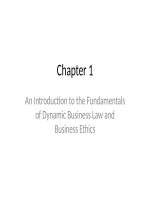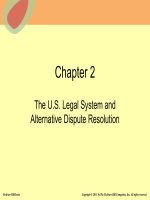An introduction to the fundamentals of dynamic business law and business ethics chap023
Bạn đang xem bản rút gọn của tài liệu. Xem và tải ngay bản đầy đủ của tài liệu tại đây (69.01 KB, 15 trang )
Chapter 23
Securities Regulation
McGraw-Hill/Irwin
Copyright © 2013 by The McGraw-Hill Companies, Inc. All rights reserved.
Chapter 23 Case Hypothetical
Thomas Abramson is a quality control manager for Capitol-IZE Pharmaceutical Company, Inc. The company is
headquartered and has its principle production facility in Indianapolis, Indiana. For several years, Capitol-IZE
Pharmaceutical has been engaged in the research and development of a new cancer drug, Izerion. As part of the
federal regulatory procedure for mass-marketing a new drug, Capitol-IZE Pharmaceutical applied to the Food and Drug
Administration (FDA) for final approval of Izerion.
Yesterday, Thomas’s supervisor informed him in somber fashion that the FDA had rejected the company’s application
for final approval of Izerion. Apparently, the FDA was concerned about serious side effects that manifested during the
drug’s clinical trials. Thomas’ supervisor further advised him that next Monday, Capitol-IZE Pharmaceutical is
scheduled to “go public” with a press release concerning the FDA’s rejection of Izerion.
Thomas is frantic. He owns approximately 6,000 shares of Capitol-IZE Pharmaceutical stock, and he knows that news
of the FDA’s rejection of Izerion will be disastrous to the company, its employees and its shareholders. Capitol-IZE
Pharmaceutical stock is currently valued at $47.50 per share, and news of the FDA’s disapproval of Izerion will likely
drive the stock down to one-half of its current value. Thomas quickly ran the numbers on his calculator. A reduction of
50% in the stock’s value would represent a personal loss of $142,500. Thomas’ Capitol-IZE Pharmaceutical stock is
his only retirement plan, aside from a modest pension he will receive from the company (assuming the company
survives Monday’s announcement.)
Thomas has a plan. Today, he will instruct his financial planner to immediately sell all 6,000 shares of his Capitol-IZE
Pharmaceutical Company, Inc. stock. Thomas rationalizes his decision by assuring himself that anyone else in his
position would do the same thing.
Is Thomas Abramson’s plan legal? Is it ethical?
23-2
Chapter 23 Ethical Dilemma
Although the Securities and Exchange Commission has existed as a federal
administrative agency for over seventy years (the Commission was created in
1934,) some critics question the need for its continued existence, or
alternatively argue for significant deregulation of stock trades. According to
critics, there is arguably no need for significant federal regulation of publiclytraded securities, since market conditions dictate legitimacy and honesty in
securities transactions; after all, for how long could a corporation exist if it does
not strive to ensure the integrity of its stock?
How do you respond to this line of reasoning, that the “free market” will dictate
fair and honest stock trades? In your answer, consider the history and mission
of the Securities and Exchange Commission.
(Reference: />
23-3
Security
Definition: Investment in a common
enterprise with the reasonable
expectation of profit gained predominantly
from others’ efforts
23-4
Securities and Exchange Commission
(SEC)
Created in 1934 to:
• Enforce securities laws
• Interpret provisions of securities acts
• Regulate the activities of securities brokers,
dealers, and advisers
• Regulate the trade of securities on securities
exchanges
23-5
Expansion of SEC Powers in the 1990s
• Securities Enforcement Remedies and Penny
Stock Reform Act of 1990
• Market Reform Act of 1990
• Securities Acts Amendments of 1990
• National Securities Markets Improvement Act of
1996
• Sarbanes-Oxley Act of 2002
23-6
The Securities Act of 1933: Terminology, Rules,
and Procedures
Registration Statement: Document containing
• Description of securities offered for sale
• Explanation of how proceeds from sale of securities will
be used
• Description of registrant’s business and properties
• Information about management of company
• Description of pending lawsuits in which registrant
involved
• Certified financial statements
23-7
The Securities Act of 1933:
Terminology, Rules, and Procedures
(Continued)
Prospectus: Written document similar to
registration statement, used as an
advertising tool to attract potential
investors
23-8
The Securities Act of 1933:
Terminology, Rules, and Procedures
(Continued)
Periods of the registration statement and
prospectus filing process:
• Pre-Filing Period
• Waiting Period
• Post-Effective Period
23-9
The Securities Act of 1933: Terminology, Rules, and
Procedures (Continued)
• Exempt Transactions-Securities exempt from standard SEC
registration requirements
• Limited Offers: Involve small amounts of money, or are offered
only to sophisticated investors
-Private Placement Exemption: Exempts private offerings of
securities
-Rule 505: States that private offerings may not exceed $5
million in a twelve-month period, and firms do not have to
believe that investors have a reasonable ability to evaluate risk
-Rule 504: Exempts non-investment firms that offer no more
that $1 million in securities in a twelve-month period
-Section 4(6): Exempts securities offered only to accredited
investors for amount less than $5 million
• Intrastate Issues: Exempt local investors in local businesses
• Re-sales of Securities: Exempt transactions by any person other
than an issuer, underwriter, or dealer
23-10
The Securities Act of 1933: Terminology, Rules,
and Procedures (Continued)
Restricted Securities: Securities acquired under Rule
505, 506, or Section 4(6) that must be registered for
resale, unless investor follows Rule 144 or 144(a)
Violations may result in:
• Administrative Action
• Injunctive Action
• Criminal Prosecution
23-11
The Securities Exchange Act of 1934:
Terminology, Rules, and Procedures
• Section 10(b): Prohibits use of “manipulative and
deceptive devices” to bypass SEC rules
• Insider Trading: Trading in which company
employee or executive uses material inside
information to make profit
• Misappropriation Theory: Individual who wrongly
acquires and uses inside information for profit is
liable for insider trading
23-12
The Securities Exchange Act of 1934:
Terminology, Rules, and Procedures
(Continued)
• Tipper/Tippee Theory: Individual who receives
material inside information as a result of insider’s
breach of duty is guilty of insider trading
• Statutory Insiders: Certain stockholders, executive
officers, and directors who must file reports detailing
their ownership and trading of the corporation’s
securities
• Short-Swing Profits: Profits made from sale of
company stock within any 6-month period by
statutory insider; per Section 16(b), these profits
must be returned to company
23-13
The Securities Exchange Act of 1934:
Terminology, Rules, and Procedures
(Continued)
• Proxy: Document that authorizes an individual to vote
shareholder’s share of stocks at a shareholder’s meeting
• Proxy Solicitation: Process of obtaining authority to vote on
behalf of shareholder
• Violations of Securities Exchange Act of 1934 may result in:
-Criminal penalties
-Civil penalties
-Suits against those involved in insider trading under Insider
Trading and Securities Fraud Enforcement Act of 1988
23-14
State Securities Laws
“Blue Sky” Laws: Regulate the offering
and sale of purely intrastate securities
23-15




![an introduction to the theory of surreal numbers [electronic resource]](https://media.store123doc.com/images/document/14/y/pg/medium_pgk1401470100.jpg)




